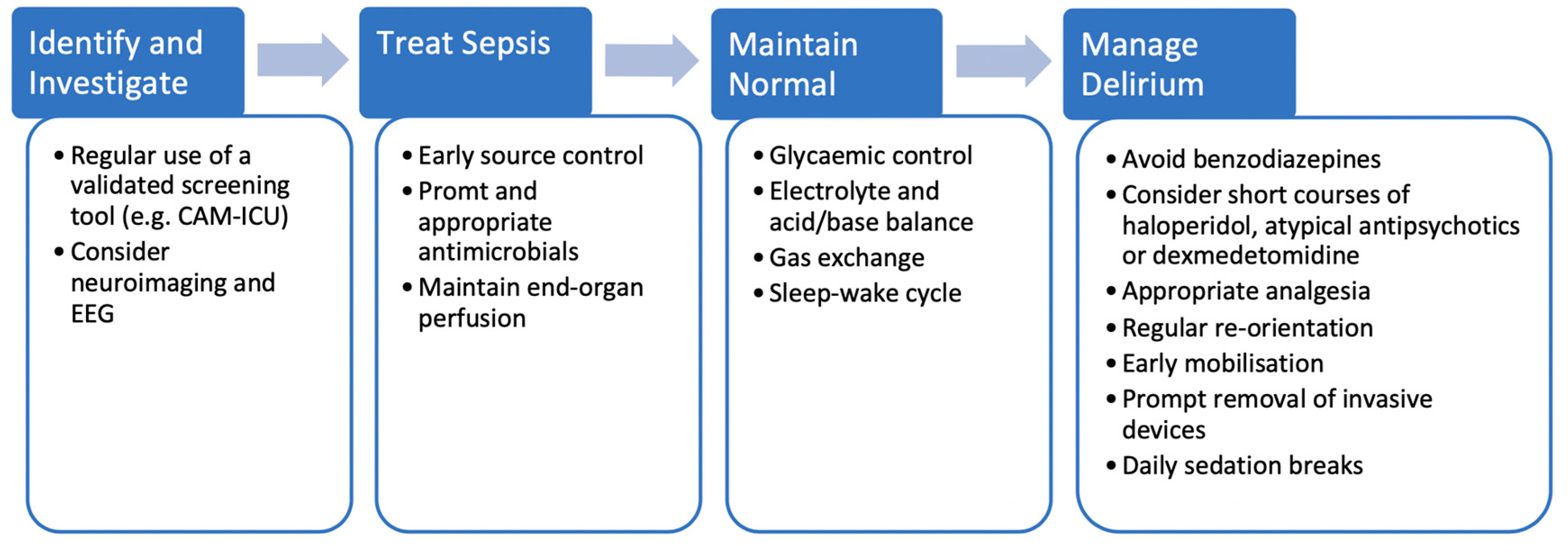How To Treat Covid Delirium
I think we can control some of the risk of delirium by affecting multiple brain pathways Khan said. However resolution of the etiologic cause does not necessarily mean the symptoms of delirium will spontaneously resolve.

Management Of Agitated Delirium In Covid 19 Patients Icu Intensive Download Scientific Diagram
Treatment for delirium depends on the cause.

How to treat covid delirium. 910 In nonCOVID. 22122020 A recently published study of risk factors for delirium in ICU-patients with COVID-19 found that involvement of family members was the only measure that significantly protected against delirium. When patients have a contact a.
There is no reason to suggest it is any different in COVID-19 infections. This finding highlights that despite obvious challenges health care workers should prioritize nonpharmacological interventions also in COVID-19 patients. 95 CI 130-215 and death aRR 124.
13072020 One of the things that reduces delirium in ICU patients is having family around when they wake up says Dr. Delirium was defined after careful revision of daily clinical reports in. Delirium is the clinical expression of an acute encephalopathy and is associated with worsened outcomes across different clinical pictures.
Delirium was a primary symptom in 37 16 of patients with delirium. 10062020 It reduces pain and anxiety. Weve begun using iPads at the bedside to try to connect patients with their families online as much as possible.
In addition delirium was associated with poor. In this cohort study of 817 older adults with COVID-19 presenting to US emergency departments delirium was common and often was seen without other typical symptoms or signs. 05082020 According to Dr.
05052020 Treatment for people with severe COVID-19 symptoms often relies on ventilators to assist with breathing and powerful long-term sedation to minimize the pain and discomfort associated with. Once the underlying problem or problems have been identified treat those medical conditions accordinglyby administering antibiotics fluids and electrolytes as needed and adjusting or discontinuing medications. Delirium is a common complication of COVID-19 infection and in some cases may be the only initial presenting feature.
The trial will show if listening to slow-tempo music can lower the number of days in delirium or coma delirium severity pain intensity anxiety and depression compared to listening to silence. 19112020 Beyond COVID-19 delirium is known to be a common presenting symptom for older adults with severe disease in the emergency department ED but goes undetected in two-thirds of cases. 21012021 Using alternatives to benzodiazepines when possible lowers delirium risk and ensuring patients can interact with family even virtually can help ground them.
Another cause could be. 19112020 A research team led by Massachusetts General Hospital scientists found that of 817 COVID-19 patients 65 and older arriving at EDs 226 28 had delirium which was the sixth most common of all signs and symptoms. Eighty-four patients with delirium 37 had no typical COVID.
Fluids and electrolytes for dehydration. George one cause of delirium in COVID-19 patients could be a lack of oxygen because of how the virus attacks the lungs. The clinical records of 852 patients admitted for suspect COVID-19 pneumonia defined as respiratory symptoms or fever or certain history of contact with COVID-19 patients plus chest CT imaging compatible with alveolar-interstitial pneumonia were retrospectively analyzed.
Delirium was associated with intensive care unit stay aRR 167. 78 Delirium is an acute state of confusion characterized by altered level of consciousness disorientation inattention and other cognitive disturbances that commonly affects older persons and is associated with adverse outcomes including prolonged hospitalization and death. But with COVID-19 thats not possible because of the risk of transmission.
16042020 In normal times health care workers often wake these patients to test their alertness and breathing and try to wean them off the ventilator which can decrease the likelihood of delirium. 02122020 A set of simple steps such as ensuring a family member is present to help people orient themselves can reduce the incidence of delirium by. How is delirium treated.
A healthcare provider may prescribe antipsychotic drugs which treat agitation and hallucinations and improve sensory issues. Benzodiazepines for problems due to drug and alcohol withdrawal.
Covid 19 Resources Hospital Elder Life Program

Icus Become A Delirium Factory For Covid Patients Kaiser Health News

Scielo Brasil Consenso Para El Manejo De La Analgesia Sedacion Y I Delirium I En Adultos Con Sindrome De Distres Respiratorio Agudo Por Covid 19 Consenso Para El Manejo De La Analgesia Sedacion
Covid 19 Resources Hospital Elder Life Program

Medicina Free Full Text Sepsis Associated Delirium Html

Prevalence And Risk Factors For Delirium In Critically Ill Patients With Covid 19 Covid D A Multicentre Cohort Study The Lancet Respiratory Medicine

How Can Healthcare Workers Adapt Non Pharmacological Treatment Whilst Maintaining Safety When Treating People With Covid 19 And Delirium The Centre For Evidence Based Medicine

